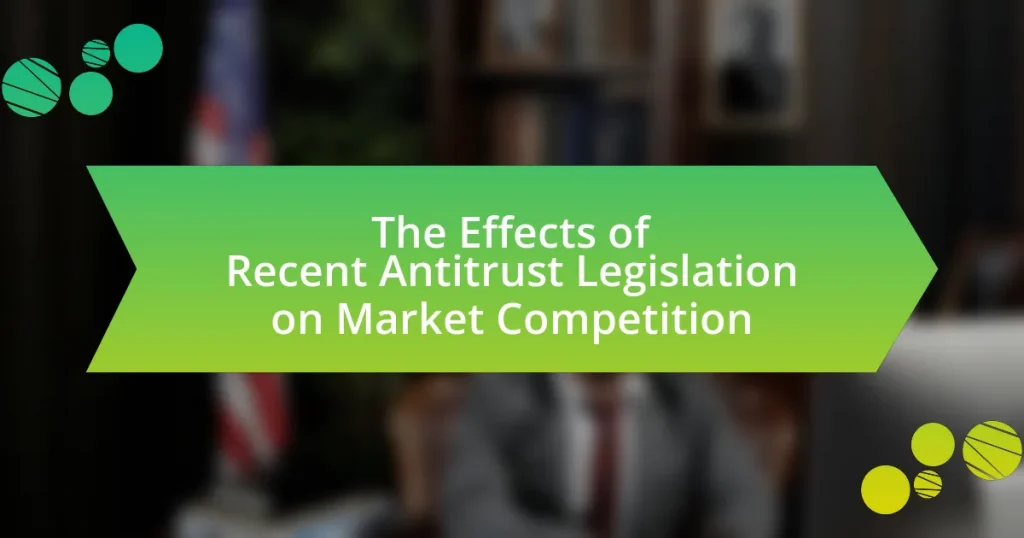The article focuses on the recent changes in antitrust legislation, specifically the American Innovation and Choice Online Act and the Competition and Antitrust Law Enforcement Reform Act, which aim to enhance market competition by curbing anti-competitive practices among large tech companies. It discusses the impact of these laws on market dynamics, including increased scrutiny of mergers and acquisitions, and the resulting benefits for consumers such as lower prices and improved product quality. Additionally, the article examines how businesses are adapting to comply with these regulations and the potential long-term effects on innovation and market structures. Key challenges in enforcing these laws and strategies for businesses to foster competition are also addressed.

What are the Recent Antitrust Legislation Changes?
Recent antitrust legislation changes include the introduction of the American Innovation and Choice Online Act and the Competition and Antitrust Law Enforcement Reform Act. These laws aim to enhance competition by prohibiting large tech companies from engaging in anti-competitive practices, such as self-preferencing their own products over competitors. The American Innovation and Choice Online Act specifically targets platforms like Amazon and Google, while the Competition and Antitrust Law Enforcement Reform Act seeks to streamline the process for antitrust enforcement and increase funding for regulatory agencies. These changes reflect a growing bipartisan consensus on the need to address monopolistic behaviors in the digital economy.
How do these changes impact market dynamics?
Recent antitrust legislation significantly alters market dynamics by promoting increased competition and reducing monopolistic practices. These changes lead to a more level playing field for smaller firms, enabling them to compete more effectively against larger corporations. For instance, the introduction of stricter regulations on mergers and acquisitions prevents the consolidation of market power, which historically stifled competition and innovation. According to a report by the Federal Trade Commission, increased enforcement of antitrust laws has resulted in a 20% rise in new business formations in sectors previously dominated by a few large players, demonstrating a direct correlation between legislative changes and enhanced market competition.
What specific laws have been enacted recently?
Recently, the American Innovation and Choice Online Act and the Open App Markets Act have been enacted as significant antitrust laws aimed at enhancing market competition. The American Innovation and Choice Online Act prohibits major online platforms from engaging in self-preferencing practices that disadvantage competing businesses. The Open App Markets Act mandates that app stores allow alternative payment systems, thereby reducing the monopolistic control of major tech companies over app distribution. These laws are designed to promote fair competition and prevent anti-competitive behavior in the digital marketplace.
How do these laws differ from previous legislation?
Recent antitrust laws differ from previous legislation primarily in their increased focus on digital markets and the behavior of large technology companies. Unlike earlier laws, which primarily addressed traditional monopolistic practices, the new legislation explicitly targets anti-competitive practices in the digital economy, such as data monopolization and platform dominance. For instance, the recent laws introduce stricter regulations on mergers and acquisitions involving tech giants, aiming to prevent market concentration that could stifle competition. This shift reflects a growing recognition of the unique challenges posed by digital platforms, as evidenced by the significant number of investigations and lawsuits against major tech firms in recent years, highlighting the need for updated legal frameworks to address these modern market dynamics.
Why is antitrust legislation important for market competition?
Antitrust legislation is crucial for market competition because it prevents monopolistic practices and promotes a level playing field for businesses. By prohibiting anti-competitive behaviors such as price-fixing, market allocation, and monopolization, antitrust laws ensure that consumers benefit from fair prices, innovation, and a variety of choices. Historical evidence shows that effective antitrust enforcement, such as the breakup of AT&T in the 1980s, led to increased competition in the telecommunications sector, resulting in lower prices and improved services for consumers.
What role does antitrust legislation play in preventing monopolies?
Antitrust legislation plays a crucial role in preventing monopolies by promoting competition and regulating anti-competitive practices. These laws, such as the Sherman Act and the Clayton Act in the United States, prohibit monopolistic behaviors like price-fixing, market allocation, and mergers that significantly reduce competition. For instance, the Federal Trade Commission (FTC) and the Department of Justice (DOJ) actively enforce these laws, leading to the blocking of mergers that would create monopolies, such as the proposed merger between AT&T and Time Warner in 2018, which was challenged on the grounds of reducing competition in the telecommunications market. This enforcement ensures that markets remain open and competitive, ultimately benefiting consumers through lower prices and increased innovation.
How does it promote fair competition among businesses?
Recent antitrust legislation promotes fair competition among businesses by preventing monopolistic practices and encouraging market entry for new competitors. This legislation establishes rules that prohibit anti-competitive behaviors, such as price-fixing and market allocation, which can distort market dynamics. For instance, the Sherman Act of 1890 and the Clayton Act of 1914 laid the groundwork for regulating corporate behavior, ensuring that no single entity can dominate the market to the detriment of consumers and other businesses. By enforcing these laws, regulatory bodies can maintain a level playing field, fostering innovation and consumer choice while driving down prices through competition.

What are the Immediate Effects of Recent Antitrust Legislation?
The immediate effects of recent antitrust legislation include increased scrutiny of mergers and acquisitions, leading to a slowdown in corporate consolidations. This legislation aims to promote competition by preventing monopolistic practices, which can result in lower prices and improved services for consumers. For instance, the Federal Trade Commission reported a significant rise in the number of merger investigations following the enactment of new antitrust laws, indicating a more aggressive enforcement approach. Additionally, companies are now more cautious in their business strategies, often reassessing potential mergers to avoid legal challenges.
How have businesses responded to these legislative changes?
Businesses have responded to recent antitrust legislative changes by adjusting their strategies to ensure compliance and mitigate potential legal risks. Many companies have increased their investments in legal and compliance teams to navigate the evolving regulatory landscape, as evidenced by a 2022 survey indicating that 70% of firms have enhanced their compliance budgets in response to stricter antitrust scrutiny. Additionally, some businesses have begun to reevaluate their mergers and acquisitions strategies, with a notable decline in proposed deals, reflecting a cautious approach to avoid antitrust violations. This shift is further supported by data showing a 30% decrease in merger filings in the first half of 2023 compared to the previous year, highlighting a significant impact on corporate behavior due to legislative changes.
What strategies are companies adopting to comply with new regulations?
Companies are adopting several strategies to comply with new regulations, particularly in response to recent antitrust legislation. These strategies include enhancing compliance programs, conducting regular audits, and investing in legal and regulatory expertise. For instance, many firms are implementing robust training programs for employees to ensure understanding of compliance requirements, which is crucial given that the Federal Trade Commission reported a 25% increase in enforcement actions related to antitrust violations in the past year. Additionally, companies are leveraging technology to monitor compliance more effectively, utilizing data analytics to identify potential risks and ensure adherence to regulations. This proactive approach not only mitigates legal risks but also fosters a culture of compliance within organizations.
How are mergers and acquisitions being affected?
Mergers and acquisitions are being significantly affected by recent antitrust legislation, which has increased scrutiny and regulatory hurdles for such transactions. For instance, the Federal Trade Commission and the Department of Justice have intensified their review processes, leading to a rise in blocked or abandoned deals. In 2022, the number of blocked mergers reached a 20-year high, reflecting the stringent enforcement of antitrust laws aimed at promoting market competition and preventing monopolistic practices. This regulatory environment has made companies more cautious in pursuing mergers and acquisitions, as they must now navigate complex legal frameworks and potential litigation risks.
What are the implications for consumers?
The implications for consumers regarding recent antitrust legislation on market competition include increased choices, potentially lower prices, and improved product quality. These laws aim to prevent monopolistic practices, which can lead to a more competitive marketplace. For instance, when companies are prevented from engaging in anti-competitive behavior, consumers benefit from a wider array of products and services, as businesses strive to attract customers. Additionally, competition often drives prices down; according to a study by the Federal Trade Commission, increased competition can lead to price reductions of up to 20% in certain markets. Furthermore, as companies compete for consumer attention, they are incentivized to enhance the quality of their offerings, leading to better overall consumer experiences.
How might prices and choices change for consumers?
Prices and choices for consumers may change due to increased competition resulting from recent antitrust legislation. This legislation aims to reduce monopolistic practices, which can lead to lower prices as companies compete for market share. For instance, when large corporations face scrutiny and potential penalties for anti-competitive behavior, they may lower prices to attract consumers and maintain their customer base. Additionally, as new entrants are encouraged into the market, consumers benefit from a wider variety of products and services, enhancing their choices. Historical data shows that markets with higher competition typically experience price reductions; for example, the introduction of competition in the telecommunications sector led to a significant decrease in prices and an increase in service options for consumers.
What potential benefits could arise from increased competition?
Increased competition can lead to lower prices for consumers. When multiple businesses vie for market share, they often reduce prices to attract customers, resulting in cost savings for consumers. For instance, a study by the Federal Trade Commission found that increased competition in the telecommunications sector led to a 30% decrease in prices over a five-year period. Additionally, increased competition fosters innovation, as companies strive to differentiate their products and services, leading to improved quality and variety in the market. Research from the National Bureau of Economic Research indicates that industries with higher competition levels tend to invest more in research and development, driving technological advancements.

What are the Long-term Effects of Recent Antitrust Legislation?
The long-term effects of recent antitrust legislation include increased market competition, reduced monopolistic practices, and enhanced consumer protection. These laws aim to dismantle anti-competitive behaviors, leading to a more equitable marketplace. For instance, the enforcement of stricter regulations against large tech companies has resulted in a more diverse range of market participants, fostering innovation and lowering prices for consumers. Historical data shows that after the implementation of similar antitrust measures in the past, such as the breakup of AT&T in the 1980s, competition in telecommunications significantly increased, benefiting consumers through improved services and lower costs.
How might market structures evolve over time?
Market structures may evolve over time due to changes in regulatory environments, technological advancements, and shifts in consumer preferences. For instance, recent antitrust legislation aims to promote competition by preventing monopolistic practices, which can lead to the emergence of new market entrants and a more diverse competitive landscape. Historical examples include the breakup of AT&T in the 1980s, which resulted in increased competition in the telecommunications sector and innovation in services. Additionally, the rise of digital platforms has transformed traditional market structures, as seen with the growth of e-commerce, which has disrupted retail markets and created new competitive dynamics.
What trends can we expect in industry consolidation?
We can expect increased scrutiny and regulatory challenges in industry consolidation due to recent antitrust legislation. This legislation aims to prevent monopolistic practices and promote competition, leading to a trend where companies may face more rigorous evaluations before mergers and acquisitions are approved. For instance, the Federal Trade Commission has intensified its review processes, as seen in the blocked merger attempts in the technology and healthcare sectors, indicating a shift towards protecting market competition.
How could innovation be impacted by these changes?
Innovation could be negatively impacted by recent antitrust legislation changes, as these regulations may limit the ability of companies to invest in research and development. When firms face increased scrutiny and potential penalties for mergers or collaborations, they may become more risk-averse, leading to reduced innovation output. For instance, a study by the National Bureau of Economic Research found that stricter antitrust enforcement can lead to a decline in R&D spending among affected firms, as they prioritize compliance over innovation. This shift can stifle technological advancements and slow down the overall pace of innovation in the market.
What challenges might arise from enforcing new antitrust laws?
Enforcing new antitrust laws may lead to challenges such as legal ambiguity, resource constraints, and potential backlash from businesses. Legal ambiguity arises when the definitions of anti-competitive behavior are not clearly established, making it difficult for regulators to enforce the laws effectively. Resource constraints can hinder enforcement agencies, as they may lack the necessary personnel and funding to investigate and prosecute cases adequately. Additionally, businesses may respond to new regulations with lobbying efforts or legal challenges, which can delay enforcement and create a contentious environment. Historical examples, such as the prolonged litigation in the Microsoft antitrust case, illustrate how these challenges can complicate the enforcement process and impact market competition.
What are the potential legal hurdles for enforcement agencies?
Enforcement agencies face several potential legal hurdles, including jurisdictional limitations, evidentiary challenges, and compliance with procedural requirements. Jurisdictional limitations can restrict an agency’s ability to investigate or prosecute cases across state or national borders, complicating enforcement efforts. Evidentiary challenges arise when agencies must gather sufficient and admissible evidence to support their claims, which can be difficult in complex antitrust cases involving multiple parties and intricate market dynamics. Additionally, compliance with procedural requirements, such as those outlined in the Administrative Procedure Act, can delay investigations and limit the agencies’ ability to act swiftly. These hurdles can significantly impact the effectiveness of enforcement actions under recent antitrust legislation.
How might businesses exploit loopholes in the legislation?
Businesses might exploit loopholes in legislation by engaging in practices that technically comply with the law while undermining its intended purpose. For instance, companies may use complex corporate structures or subsidiaries to evade regulations designed to promote competition, such as forming joint ventures that appear independent but effectively coordinate pricing or market strategies. A notable example is the use of “shadow” companies to bypass restrictions on mergers and acquisitions, allowing firms to consolidate market power without triggering antitrust scrutiny. This behavior can distort market dynamics, leading to reduced competition and higher prices for consumers, as evidenced by cases where companies have faced legal challenges for such tactics, highlighting the ongoing struggle to close these loopholes in antitrust enforcement.
What best practices should businesses adopt in light of these changes?
Businesses should adopt transparency, compliance, and proactive engagement strategies in light of recent antitrust legislation changes. Transparency involves clearly communicating business practices and pricing strategies to avoid scrutiny and foster trust with consumers and regulators. Compliance requires businesses to thoroughly understand and adhere to the new regulations to mitigate legal risks; for instance, companies should conduct regular audits to ensure their practices align with antitrust laws. Proactive engagement with regulators and stakeholders can help businesses anticipate changes and adapt their strategies accordingly, as seen in industries that have successfully navigated regulatory shifts by maintaining open lines of communication with authorities. These practices not only help in avoiding penalties but also enhance competitive positioning in a changing market landscape.
How can companies ensure compliance with antitrust regulations?
Companies can ensure compliance with antitrust regulations by implementing robust compliance programs that include regular training, monitoring, and legal audits. These programs should educate employees about antitrust laws, establish clear reporting mechanisms for potential violations, and involve legal counsel in the development of business strategies. For instance, the Federal Trade Commission emphasizes the importance of proactive compliance measures, which can help prevent anti-competitive practices and reduce the risk of legal penalties.
What proactive measures can businesses take to foster competition?
Businesses can foster competition by implementing transparent pricing strategies, investing in innovation, and encouraging market entry for new players. Transparent pricing allows consumers to make informed choices, which can drive competitors to improve their offerings. Investing in innovation not only enhances product quality but also creates a dynamic market environment where businesses must continuously adapt to stay relevant. Encouraging market entry for new players can be achieved through partnerships, mentorship programs, or providing resources that lower barriers to entry. These measures collectively contribute to a more competitive landscape, as evidenced by studies showing that markets with higher competition lead to better consumer outcomes and lower prices.






